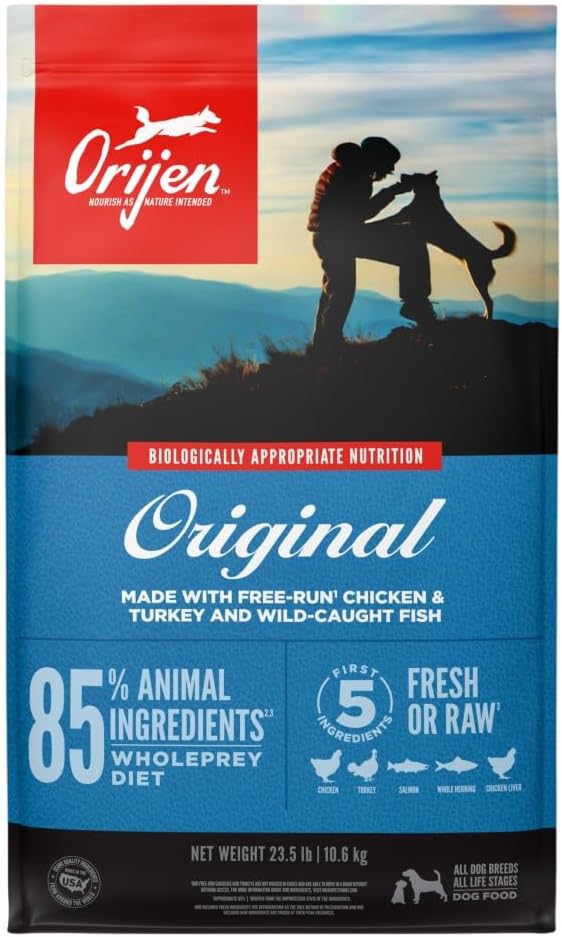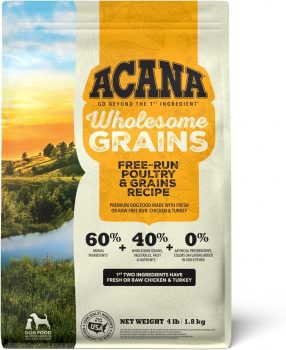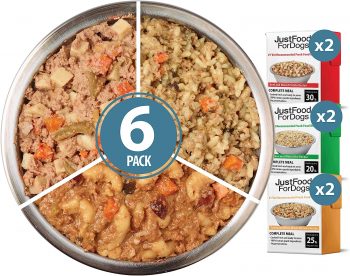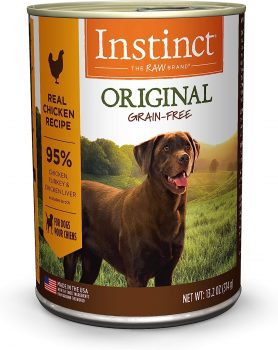Greyhounds, celebrated for their graceful speed and gentle temperament, have specific dietary requirements crucial for their health and performance. Understanding the nutritional needs of Greyhounds is critical for owners to provide a diet that supports their active lifestyle and maintains their overall well-being. This comprehensive guide will delve into the ideal diet for Greyhounds, ensuring they receive the proper nutrition tailored to their unique needs.
Understanding Greyhound Nutritional Needs
Greyhounds require a balanced diet that includes proteins, fats, carbohydrates, vitamins, and minerals. Their diet should cater to their high metabolism, support muscle health, and maintain overall vitality. High-quality protein is essential for muscle maintenance; fats provide energy, carbohydrates offer additional power, and fiber aids digestion.
Our 5 Top Foods for Greyhounds
The diets were selected by our founder Justin Palmer, a certified canine nutrition expert, specifically with Greyhounds in mind:
| Food | Pros | Cons |
|---|---|---|
|
|
|
|

Check Today's Price on: |
|
|

Check Today's Price on: |
|
|

Check Today's Price on: |
|
|

Check Today's Price on: |
|
|
High-Quality Protein: Essential for Muscle Maintenance
Protein is crucial in a Greyhound’s diet, particularly for maintaining lean muscle mass. Sources such as chicken, beef, fish, and eggs provide the essential amino acids for muscle development and repair. Alternative protein sources like lamb or venison can be considered for Greyhounds with food sensitivities.
The Role of Fats in a Greyhound’s Diet
Fats are vital to a Greyhound’s diet, providing a concentrated energy source. Omega-3 and omega-6 fatty acids, found in sources like fish oil and flaxseed, are beneficial for maintaining healthy skin and a shiny coat. However, the fat content should be carefully balanced to prevent obesity.
Carbohydrates and Fiber: Supporting Digestive Health
Carbohydrates provide Greyhounds with the necessary energy and contain fiber, which is crucial for a healthy digestive system. Sources like brown rice, vegetables, and certain fruits offer healthy carbohydrates and fiber. However, their carbohydrate intake should be monitored to maintain a healthy weight.
Essential Vitamins and Minerals
A balanced diet for Greyhounds must include the right mix of vitamins and minerals. These nutrients support various body functions, including immune health, bone strength, and metabolic processes. High-quality commercial dog foods are usually fortified with these essential nutrients.
Hydration: A Vital Aspect of Greyhound’s Diet
Hydration is critical for Greyhounds. They should always have access to clean water to support their active lifestyle and help digestion and nutrient absorption. Adequate hydration is also crucial in maintaining kidney and urinary tract health.
Feeding Schedule and Portion Control
Greyhounds typically benefit from a structured feeding schedule, typically two meals daily. Portion control is essential to prevent overfeeding and maintain a healthy weight. The portion size will vary depending on the dog’s age, size, and activity level.
Special Dietary Considerations for Greyhound Puppies
Puppy-specific formulas are recommended for Greyhound puppies as they have different nutritional requirements than adult dogs. These formulas are more prosperous in calories and nutrients to support their rapid growth and development.
Managing Health Issues Through Diet
Greyhounds are prone to specific health issues like bloat and osteosarcoma. A diet that is easy to digest and calorie-controlled can help mitigate the risk of bloat. Foods rich in calcium and phosphorus are essential for bone health.
Choosing the Right Food: Dry Kibble vs. Wet Food
Choosing between dry kibble and wet food for a Greyhound depends on individual needs and preferences. Dry kibble is often recommended for its convenience and dental benefits, while wet food can be more palatable and hydrating. Some owners opt for a combination of both.
Supplementing Your Greyhound’s Diet
While a balanced diet should provide most nutrients, some Greyhounds might benefit from supplements. Supplements like glucosamine for joint health, omega-3 fatty acids for coat health, and probiotics for digestive health can be considered. Always consult with a vet before adding supplements.
Human Foods: Safe and Unsafe for Greyhounds
Certain human foods, such as lean meats, some vegetables, and fruits, can be safe for Greyhounds in moderation. However, avoiding foods that are toxic to dogs, like chocolate, grapes, onions, and foods containing xylitol, is essential.
The ideal diet for a Greyhound fulfills their specific nutritional needs and helps prevent common breed-specific health issues. A balance of high-quality proteins, fats, carbohydrates, vitamins, minerals, and plenty of water is critical to their health. Regular check-ups with a vet and monitoring their diet and body condition can ensure that your Greyhound maintains a healthy and happy life.
What Health Issues Are Greyhounds Prone To, and How Can a Proper Diet Help?
Greyhounds, known for their sleek physique and incredible speed, are generally healthy dogs. However, they are susceptible to specific health issues due to their unique physical characteristics and genetic predispositions. A proper diet plays a crucial role in preventing and managing these conditions. This article explores the common health issues in Greyhounds and how nutritional management is integral to their health and well-being.
Osteosarcoma: A Serious Concern in Greyhounds
Greyhounds are at a higher risk for osteosarcoma, a type of bone cancer. While a diet cannot prevent cancer, a balanced diet rich in antioxidants can support overall health. Foods high in vitamins E and C, selenium, and carotenoids can boost the immune system and potentially help in the fight against cancer.
The Risk of Bloat and Gastric Torsion
Bloat, or gastric torsion, is a life-threatening condition that Greyhounds are particularly susceptible to due to their deep chests. Feeding smaller, more frequent meals and avoiding vigorous exercise around meal times can help. A diet that’s easy to digest and doesn’t produce excessive gas is also beneficial.
Managing Obesity with Proper Nutrition
Obesity is less common in Greyhounds than in other breeds, but maintaining an ideal weight is still crucial. A diet with controlled calorie intake, rich in lean proteins and low in fats, and regular exercise is essential. Portion control and limited treats can help keep a Greyhound at a healthy weight.
Joint Health: Nutritional Implications
Greyhounds can experience joint issues, especially in their later years. Incorporating foods rich in omega-3 fatty acids, glucosamine, and chondroitin into their diet can support joint health and mobility. Keeping them at a healthy weight also reduces the stress on their joints.
Dental Health: Often Overlooked in Greyhounds
Greyhounds are prone to dental issues. Feeding dry kibble that helps scrape away plaque, regular dental check-ups, and teeth cleaning can maintain oral health. Chew toys and dental treats can also contribute to keeping their teeth clean.
The Importance of a Balanced Diet for Heart Health
Heart conditions, including murmurs and valve diseases, can concern Greyhounds. A diet low in sodium and rich in heart-healthy nutrients like taurine and L-carnitine can support heart function. Regular veterinary check-ups are essential for early detection and management.
Skin and Coat Health in Greyhounds
Greyhounds have thin skin and are prone to cuts, scrapes, and irritations. A diet rich in essential fatty acids, particularly omega-3 and omega-6, can promote healthy skin and a shiny coat. A high-quality diet free from common allergens can also prevent skin allergies.
Maintaining Digestive Health
Greyhounds can have sensitive digestive systems. A diet with highly digestible proteins, limited ingredients, and the right balance of fiber can promote a healthy gut. Avoiding foods that cause gas and bloat is particularly important for this breed.
The Role of Diet in Muscle Health
As athletic dogs, maintaining muscle health is crucial for Greyhounds. Diets rich in high-quality proteins help in muscle repair and maintenance. Ensuring adequate protein intake is especially important for retired racing Greyhounds transitioning to a more sedentary lifestyle.
Nutritional Needs of Senior Greyhounds
As Greyhounds age, their dietary needs change. Senior dogs may need diets lower in calories but higher in fiber and supplements to support joint health and cognitive function. Adjusting their diet to these changing needs is essential for maintaining their quality of life.
Understanding the health issues Greyhounds are prone to, and the significant role diet plays in prevention and management is essential for their care. A balanced diet tailored to their needs and regular veterinary check-ups can mitigate many health risks. Each Greyhound is unique, and their dietary needs may vary, so it’s essential to consult a veterinarian for personalized advice.
Frequently Asked Questions About Feeding Greyhounds
1. What is the best type of food for a Greyhound?
The best diet for a Greyhound is high-quality, balanced, protein-rich dog food. It should include real meat as the first ingredient and be appropriate for their age, size, and activity level. Foods with excessive fillers or artificial additives should be avoided, as Greyhounds can have sensitive stomachs.
2. How much should I feed my Greyhound each day?
The amount of food for a Greyhound varies based on age, weight, and activity level. Generally, adult Greyhounds require about 2 to 4 cups of dry food per day, divided into two meals. Adjust the portion size based on your dog’s needs, and consult your veterinarian for specific recommendations.
3. Can Greyhounds eat grain-free diets?
Grain-free diets can suit Greyhounds, especially if they have grain allergies or sensitivities. However, ensure the diet still provides all the necessary nutrients, and consult with a veterinarian before making any significant changes to your dog’s diet.
4. Is it safe to feed my Greyhound human food?
Some human foods, like plain, cooked meats and certain vegetables and fruits, are safe for Greyhounds in moderation. However, avoid foods toxic to dogs, such as chocolate, grapes, onions, and anything containing xylitol.
5. How often should I feed my Greyhound?
Greyhounds should be fed twice daily – once in the morning and once in the evening. This helps manage hunger, maintain consistent energy levels, and aid digestion.
6. What supplements should I consider for my Greyhound?
Some Greyhounds may benefit from supplements like fish oil for omega-3 fatty acids, glucosamine and chondroitin for joint health, and probiotics for digestive health. However, always consult a veterinarian before introducing supplements to ensure they are necessary and appropriate for your dog.
7. Can Greyhounds be vegetarian?
Feeding a Greyhound a vegetarian diet can be challenging, as it may not provide all the necessary nutrients, especially protein. If considering a vegetarian diet, consult with a veterinarian to ensure all nutritional needs are met.
8. How can I tell if my Greyhound is overweight?
An overweight Greyhound may have less visible definition in the waist, and you might not be able to feel their ribs quickly. Regular check-ups with a vet and monitoring their body condition can help determine if they are overweight and need dietary adjustments.
9. What should I feed my Greyhound puppy?
Greyhound puppies should be fed a high-quality formula rich in protein and fats to support their growth. Choose a formula designed for medium to large breeds to ensure proper development.
10. Can I change my Greyhound’s diet quickly?
It’s best to gradually transition your Greyhound to a new diet over a week or more. Start by mixing a small amount of the fresh food with the old, gradually increasing the fresh food and decreasing the old to avoid gastrointestinal upset.
11. How does diet affect my Greyhound’s health?
A proper diet is crucial in preventing obesity, maintaining joint health, supporting digestive health, and ensuring a healthy coat and skin in Greyhounds. A balanced diet can also reduce the risk of chronic diseases and allergies.
12. Should I feed my Greyhound wet or dry food?
Both wet and dry foods are suitable for Greyhounds. Dry food can help with dental health and is often more calorie-dense, while wet food can be more palatable and hydrating. Some owners choose a combination of both for variety.
13. What are the signs of food allergies in Greyhounds?
Signs of food allergies in Greyhounds include itchy skin, ear infections, chronic diarrhea, and vomiting. If you suspect your Greyhound has a food allergy, consult a vet who may recommend an elimination diet to identify the allergen.
14. How do I know if my Greyhound’s diet is nutritionally balanced?
A nutritionally balanced diet for a Greyhound should result in a healthy weight, a shiny coat, regular bowel movements, and overall good health. If you have concerns about your Greyhound’s diet, consult a veterinarian for advice and dietary adjustments.
15. Can Greyhounds have dairy products?
Some Greyhounds can tolerate small amounts of dairy products, but many are lactose intolerant. Dairy can cause gastrointestinal upset in these dogs, so avoiding or limiting dairy products is best. If you choose to give dairy, start with small amounts and monitor for any adverse reactions.
 Check Today's Price on:
Check Today's Price on:
 Toledo, United States.
Toledo, United States.
